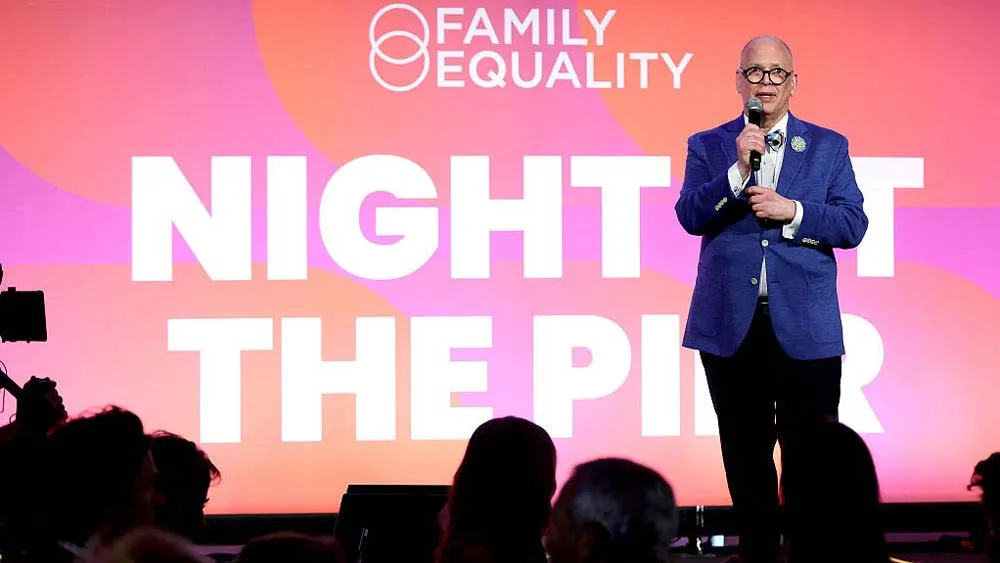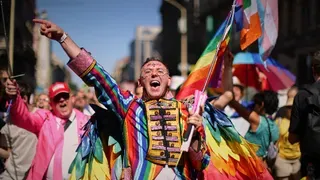January 31, 2013
Remembering NLGJA's Michael Triplett
Chris Sosa READ TIME: 5 MIN.
Lisa Carter is speaking as a nurse when she recalls the end of her brother's life Jan. 17, a final act likely drawn out because of Michael Triplett's constitution.
''He had a strong heart,'' she says.
As Triplett's sister, it was a figurative fact she'd known all along.
Although Triplett, undergoing treatment for oral cancer for nearly two years before his death, may have been best known to the LGBT community as the president of the D.C.-based National Lesbian & Gay Journalists Association, friends and family are eager to share more of who Triplett was.
Carter, for one, thinks of her younger brother as the perfect uncle to her two children.
''My kids were his only niece and nephew,'' she explains. ''Family was very important to Mike. There was never a time in my kids' lives my bother wasn't there - christenings, confirmation, Little League Baseball.... Mike was my daughter's godfather. There hasn't been a Christmas my kids haven't seen Uncle Mike. There wasn't ever a birthday that got missed by Uncle Mike.''
That sense of family was evident in Triplett's final days in Huntsville, Ala., home to his sister and mother, Shirley Triplett, watched over by them and his partner, Jack Squier. The strong heart was evident long before.
''Early in his career, he worked with a lot of people suffering from drug addiction, serious illness,'' says Randy Carswell, who with his partner, Todd Feldman, knew Triplett for nearly 20 years. That job was working at a legal clinic associated with the American University Washington College of Law - the reason for Triplett moving to Washington in the mid 1990s, adding a law degree to an academic career begun in his home state of Missouri, with undergrad studies in journalism and political science and a master's degree in education. ''Mike rallied for those folks. The understanding and compassion he gave each and every case showed me his character.''
Triplett's strong heart contributed mightily to the pulse of his church, St. Paul's Lutheran Church, where he served as president of the church council. That Triplett joined this particular church may have been a matter of convenience as much as fate or doctrine, his mother points out.
''It was across the street,'' she says, making it a good choice - if it passed the test. ''He asked the minister how the church felt about gay people.''
The answer Triplett got sealed the deal.
''We were convenient - nothing wrong with that,'' the Rev. Tom Omholt grants with brief, soft laugh. ''But I think Mike appreciated our liberal and progressive interpretations, being inclusive.''
At the LGBT-affirming St. Paul's, Triplett quickly wove himself into the church's fabric, participating in a mission trip to Zambia where he helped children orphaned by the AIDS epidemic, worked in the church food bank, and even offered himself as a sort of Lutheran ambassador.
''We have this wonderful picture of him at the UDC-Van Ness Metro. He'd put a sign on that said, 'Ask a Lutheran. Have any questions? Let's talk,''' says Omholt, seemingly heartened by the memory. ''Michael was passionate about all aspects of church life, particularly when it came to reaching out and helping the hurting. He felt the need to really make the gospel come alive and help the least of those among us.''
Shirley Triplett says there were junctures in her son's youth that early on gave her a sense of both the strength and curiosity that would mature in her son. First, it was complications with Triplett's jaw that involved childhood surgery, a speech impediment and speech therapy beginning in the first grade.
''Once he got to high school, he joined the debate team,'' she says with obvious pride in her son's ability to master his circumstance. ''That tells you something about his character. ... I always think about a trip we took to Chicago when Mike was in high school. He was amazed, staying in the hotel, with all these people speaking all these languages.''
Squier says that amazement made Triplett a wonderful travel partner, which was particularly important in that Triplett learned of his cancer the same time Squier learned he'd be moving to Kyrgyzstan to spend a year working with the Organization for Security and Co-operation in Europe (OSCE).
''I got the job offer the day he got the diagnosis,'' Squier recalls. ''It was a somewhat more hopeful diagnosis. We thought, 'I'll do this job and Mike will get himself taken care of.'''
Those events color the first entries Triplett posted to a blog he began April 20, 2011, his 47th birthday.
''I don't usually get all that excited about birthdays and this year, especially, I'm not exactly jumping for joy,'' Triplett wrote. ''Oh, I probably should be. I have a great boyfriend, a job I like and where I'm doing well, a wonderful family and group of friends.
''But I also get to see a doctor today about my cancer. A week after it being diagnosed, Jack and I are going to see a head and neck oncologist to figure out what to do about this little tumor on my tongue. Well, I hope it's little. I pray it's little. We will see.''
Through months of entries - a variety of heartbreaking, humorous and hopeful - Triplett told his own story, as only he could. One of the entries shares his excitement about planning a trip to meet Squier in the Netherlands. Squier remembers the trip as a highlight of his year away.
''We went to Amsterdam, we went to The Hague,'' say Squier, laughing as he thinks of a photo from that trip, Triplett fending off a brazen seagull. ''It was Mike doing his very best Tippi Hedren impersonation. It's one of my more vivid memories of that trip. Mike was remarkably easy to travel with - extremely intelligent, always very curious. It was hard to get bored around him.''
Squier says it's also hard to feel much bitterness about having had only four years with Triplett.
''We both had dated fairly seriously, but for me, at any rate, it was the first time I was actually going to live with anyone,'' he shares. ''I could dwell on the fact that I didn't have that much time, but the time I had with him was wonderful. It's hard for me to get angry not to have more.''
For Todd Feldman, Carswell's partner, there is that sense of wanting to celebrate Triplett's legacy of engagement and philanthropy. He says that's going to be particularly hard on Super Bowl Sunday.
''Mike and I bonded early about our dislike of the Super Bowl,'' Feldman says of their years-long friendship. ''Every Super Bowl we went to a restaurant or a bar that did not have a TV. It became 'margarita night.' This Sunday is going to be very difficult, very tough for us. We're going to go and have a margarita for Mike. It's not going to be easy. It's not going to be the same.''
Rev. Omholt says the Saturday prior, Feb. 2, when he delivers Triplett's memorial service, will attempt to be a celebration, but grants that the circumstances are challenging.
''Something has to do with the fact that he was only 48,'' says Omholt. ''Last week, we had a funeral for a man who was 92, and we grieved. But there's something that happens when someone so young is taken from us. People liked Mike and respected him. He was just a helluva nice guy.''
A memorial service for Michael Triplett will be held Saturday, Feb. 2, at St. Paul's Lutheran Church, 4900 Connecticut Ave. NW. There will be visitation in the church baptistery 11 a.m. to noon, memorial service at noon, then a reception including opportunity for friends to share memories of Triplett. Suggested memorial donation recipients are St. Paul's Lutheran Church; NLGJA, 2120 L St. NW, Suite 850, Washington, D.C., 20037; and Hospice Family Care, 3304 Westmill Drive SW, Huntsville, Ala., 35805.







